Understanding NYC Criminal Background Checks: Importance and Overview
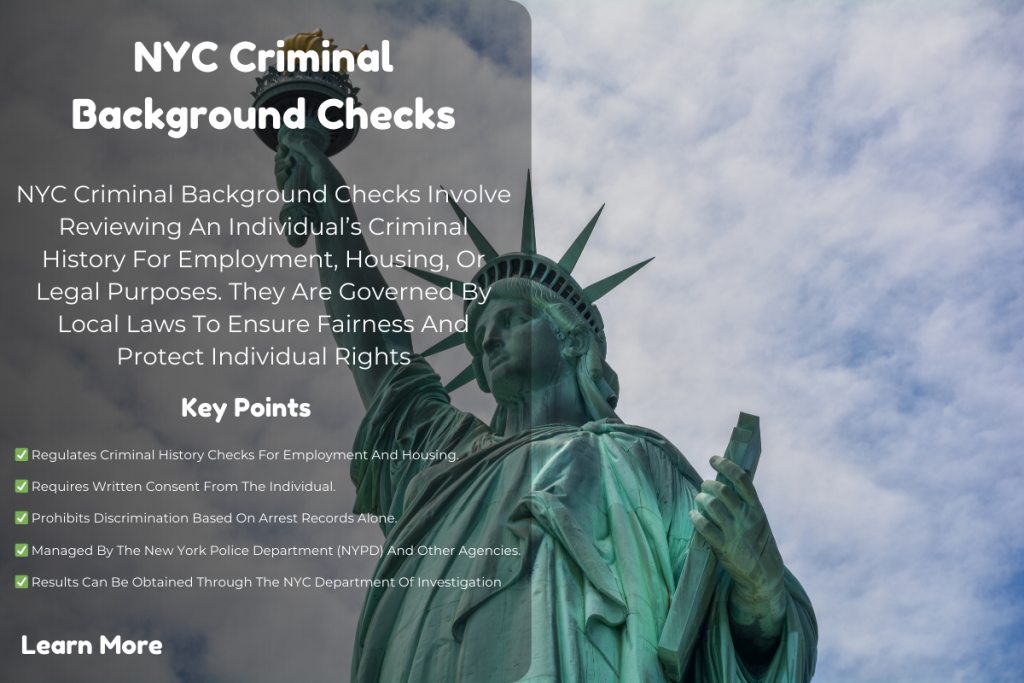
Introduction to NYC Criminal Background Checks
A criminal background check is a vital process used to assess an individual’s criminal history. In New York City (NYC), criminal background checks are frequently required for a variety of reasons, including employment applications, housing rentals, and licensing purposes. These checks help organizations and individuals assess the trustworthiness and suitability of someone for specific roles or responsibilities, ensuring safety and compliance with the law. A background check reveals key details about an individual’s interactions with the criminal justice system, which can influence their eligibility for certain opportunities or roles.
Why Criminal Background Checks Are Important in NYC
In NYC, criminal background checks play an important role in various sectors, particularly in ensuring public safety and reducing risks for employers, landlords, and licensing authorities. Some of the main reasons for conducting criminal background checks in the city include:
- Employment: Employers use background checks to ensure that potential employees do not pose a risk to workplace safety or company reputation. A clean criminal record can be essential for jobs involving sensitive information, financial management, or public-facing positions.
- Housing: Landlords and property managers often run criminal background checks on prospective tenants to ensure the safety and well-being of their current tenants. Criminal history may impact the likelihood of an individual being approved for housing.
- Licensing: For certain professions, especially those involving vulnerable populations (such as childcare, healthcare, and education), a clean criminal background is a requirement for obtaining a license.
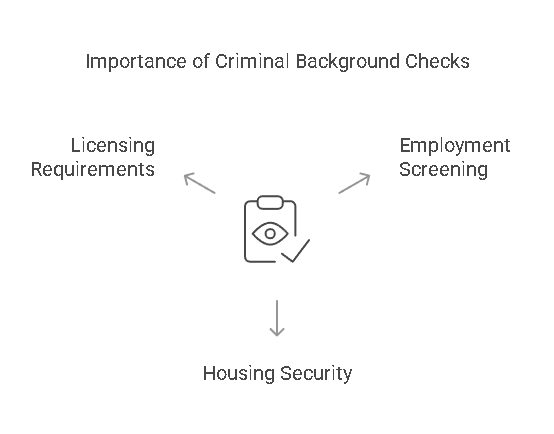
What Does a Criminal Background Check in NYC Include?
A NYC criminal background check typically includes various types of records that give insight into an individual’s past legal troubles. Common components include:
- Arrests: A check will include any arrests that have occurred, even if the individual was not convicted of a crime. Arrest records can indicate involvement in criminal activity, though they do not confirm guilt.
- Convictions: This is one of the most significant aspects of a background check, as it reflects whether an individual was found guilty of a crime. This includes misdemeanors, felonies, and even lesser infractions. Convictions are likely to have a significant impact on employment or housing opportunities.
- Sex Offender Registry: A background check will also include whether the individual is registered in the sex offender registry. This is particularly relevant for jobs or positions that involve working with vulnerable populations, such as children or the elderly.
- Warrants and Pending Cases: Depending on the depth of the background check, it may also include details about outstanding warrants or any cases that are currently pending legal resolution.
NYC Criminal Justice System and Public Availability of Records
New York City’s criminal justice system involves several agencies responsible for maintaining and updating criminal records, including the NYPD (New York City Police Department), the New York State Division of Criminal Justice Services (DCJS), and the New York State Unified Court System. These agencies track and store criminal records related to arrests, convictions, and other legal proceedings. The information collected is made available through official channels, such as:
- NYPD: The police department records arrest information and charges, which may appear in an individual’s background check.
- New York State DCJS: The DCJS manages criminal records in New York, including felony and misdemeanor convictions, and can provide a full report for those requesting background checks.
- NYC Courts: The court system maintains records of cases heard in NYC courts, including information about convictions, sentences, and any legal outcomes.
The NYC criminal background check system also ties into broader New York State laws, particularly when it comes to public access to criminal records. While individuals have the right to access their own records, public access to some types of criminal information can be restricted, depending on the case or whether certain records are sealed or expunged.
Impact of Sealed and Expunged Records
Certain types of criminal records in New York can be sealed or expunged, particularly for individuals who have completed sentences or for specific charges that do not result in a conviction. For instance, under the New York State Criminal Procedure Law (CPL), individuals can petition to have certain criminal records sealed or erased from public access if they meet specific criteria. For many, this provides a second chance, especially when applying for jobs, housing, or other opportunities.
The Ban the Box law, which was introduced in NYC, has further strengthened the process of eliminating discrimination based on criminal history. It mandates that employers delay asking about criminal history until later in the hiring process, giving applicants a fair chance to be evaluated based on their qualifications and skills first. This law is part of broader efforts to limit the impact of criminal records in employment decisions and ensure individuals are not unfairly discriminated against for past mistakes.
Why You Need to Understand the NYC Criminal Background Check System
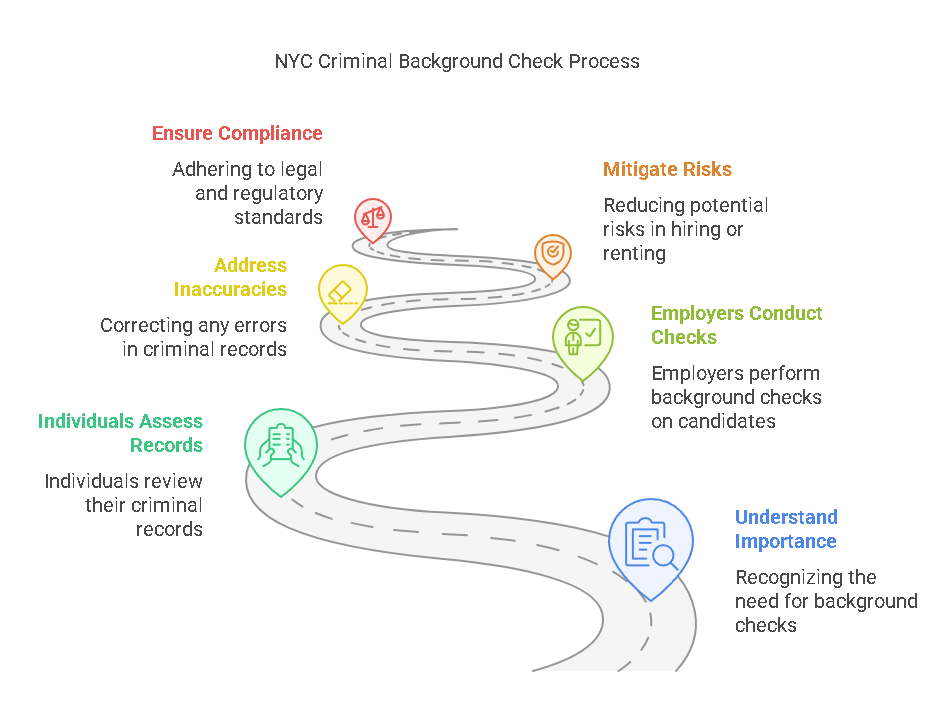
Understanding the criminal background check system in New York City is crucial for both individuals and businesses. For individuals, it’s important to know what will appear on your criminal record when applying for jobs or housing, and how to address any concerns about inaccurate or outdated information. For employers and organizations, conducting a thorough and compliant criminal background check is vital for making safe, informed decisions about employees or tenants.
By understanding the process, individuals can also take proactive steps to correct any inaccuracies in their records and ensure they are presenting the most accurate information possible. On the other hand, organizations and businesses benefit from conducting background checks to mitigate risks, ensure compliance with relevant laws, and promote a safer environment for their workforce and clientele.
In the next section, we will dive into the steps involved in obtaining a NYC criminal background check, as well as the agencies involved and the essential resources available to individuals and businesses navigating this process.
How to Obtain a NYC Criminal Background Check
Obtaining a NYC criminal background check is a critical step for employers, landlords, licensing agencies, and individuals looking to understand their criminal history. In this section, we will provide a step-by-step guide on how to obtain a criminal background check in NYC, including information on government resources, online platforms, and third-party services. Additionally, we will outline the necessary steps, required documents, and the different agencies involved in the process.
Step-by-Step Guide to Obtaining a NYC Criminal Background Check
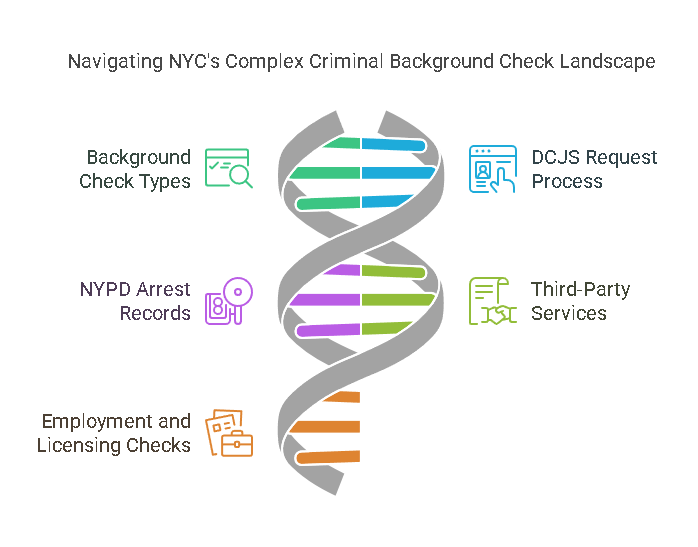
1. Determine the Type of Background Check You Need
Before starting the process, it’s important to determine the type of background check you need. There are various types of background checks, and the level of detail you need will depend on your specific situation. Here are the most common types of background checks in NYC:
- Basic Criminal History Check: A search of an individual’s criminal record for any prior arrests and convictions. This is typically used for employment purposes or general knowledge.
- Fingerprints-based Check: This type of check is more detailed and often used for professional licensing, childcare, healthcare jobs, or positions involving vulnerable populations. Fingerprints are used to run a more thorough search through state and national criminal databases.
- Sex Offender Registry Search: Employers or landlords might specifically request a check on an individual’s inclusion in the sex offender registry as part of a background check for safety purposes.
Each of these checks may require different processes and documents.
2. Requesting a Background Check from the NYC Department of Criminal Justice Services (DCJS)
One of the main agencies involved in criminal background checks in NYC is the New York State Division of Criminal Justice Services (DCJS). This agency maintains the database of criminal history information, including arrests and convictions. Here is how to request a background check through the DCJS:
- Online Request: Individuals can access the DCJS online portal to request their criminal history record. This is a quick and efficient way to obtain a criminal record check. The process typically involves submitting personal information such as your full name, date of birth, and any previous addresses.
- Mail Request: You can also submit a request via mail to the DCJS, but this method takes longer than submitting online. You will need to complete a form (available on the DCJS website) and submit it along with the required payment.
- Fees: The fee for a criminal background check through the DCJS typically ranges from $60 to $75, depending on the nature of the request.
3. Using the NYC Police Department (NYPD) for Arrest Records
If you’re specifically interested in arrest records, you may request them directly from the NYC Police Department (NYPD). The NYPD can provide a background check that includes details of arrests within New York City. This can be done by visiting one of the NYPD’s precincts or contacting the department for a request form. It’s important to note that the NYPD only has arrest records for offenses that occurred within the city limits.
Here’s how to request an arrest record from the NYPD:
- Online: The NYPD offers an online request service through their website. This is ideal for checking on specific cases or for a general history of arrests within the city.
- In-Person or Mail Request: You can also request arrest records in person or by mail through the NYPD’s Records Division. Be prepared to provide personal identification and information about the arrest you are inquiring about.
4. Third-Party Background Check Services
If you want to simplify the background check process and receive quicker results, third-party background check companies can be a useful option. These companies have the expertise to navigate complex background check procedures and provide fast, accurate results. Services like Precisehire specialize in criminal background checks and can assist businesses and individuals in obtaining comprehensive reports.
At Precisehire, we offer an expedited service that can help businesses and individuals efficiently obtain criminal background checks. Our platform is designed to streamline the process and ensure you receive reliable results quickly and securely. With our services, you can skip the complicated paperwork and lengthy processing times often associated with government background check requests.
5. Fingerprint-Based Background Check for NYC Criminal History
For those needing a more thorough background check, such as professionals applying for licenses, a fingerprint-based background check is required. This method uses biometric information to run a more detailed search through both state and national criminal databases.
Here’s how to go about obtaining a fingerprint-based background check:
- Live Scan Fingerprinting: This is a process where your fingerprints are electronically scanned and submitted to a criminal database. The service is available through authorized agencies such as the New York State Division of Criminal Justice Services or other private fingerprinting services.
- Required Documents: You will typically need to provide identification documents, such as a driver’s license or passport, as part of the fingerprinting process.
- Processing Time: This type of check may take several days to complete, as the results are pulled from both state and federal databases.
6. Requesting a Background Check for Employment, Housing, or Licensing
- For Employment: Employers in NYC can request background checks for job candidates through either the DCJS or private third-party services. The type of check varies depending on the job position and level of responsibility.
- For Housing: Landlords and property managers can request a criminal background check as part of the tenant screening process. They may use a third-party service, or they may request the information directly from the DCJS or NYPD.
- For Licensing: Individuals applying for professional licenses, such as those in healthcare, childcare, or law enforcement, may be required to submit to a fingerprint-based background check. The relevant licensing board will guide applicants on the required procedure.
Required Documents for a NYC Criminal Background Check
To obtain a criminal background check, the following documents and information are typically required:
- Proof of Identity: A government-issued ID (driver’s license, passport, etc.).
- Proof of Residency: Previous addresses may be required for more comprehensive checks.
- Application Form: A completed application form for background check services.
- Payment: Fees for criminal background checks are generally required to be paid at the time of request. These can vary depending on the type of check.
A Comparison of Criminal Background Check Methods
Here’s a comparison table of the different types of background checks and their effectiveness in detecting criminal activity:
| Type of Check | What It Includes | Best For | Processing Time |
|---|---|---|---|
| Basic Criminal History Check | Arrests, convictions | General criminal history for employment, etc. | 1–2 weeks |
| Fingerprints-Based Check | Detailed arrest, conviction records | Employment in sensitive jobs (e.g., childcare) | 1–3 weeks |
| Sex Offender Registry Check | Information on sex offender registry | Employment, housing, or volunteer roles | 1 week |
| NYPD Arrest Record Check | Arrests within NYC | Those who need information on arrests within NYC | 1–2 weeks |
As seen in the table above, the best method for obtaining a criminal background check depends on the nature of your need, whether it’s for employment, housing, or licensing purposes.
How Precisehire Can Help with NYC Criminal Background Checks
At Precisehire, we understand the complexities of criminal background checks in NYC. Our platform helps both individuals and businesses streamline the process by providing quick access to comprehensive reports. We assist in gathering information from reliable sources like the DCJS and NYPD, ensuring that you receive accurate and up-to-date results in a timely manner.
Whether you are an employer conducting background checks for multiple candidates or an individual wanting to access your criminal history, Precisehire provides a solution that saves you time and effort.
Legal Aspects, FAQs, and Conclusion
When it comes to conducting a NYC criminal background check, there are various legal considerations that individuals and businesses must be aware of. In this section, we will delve into the legal aspects of criminal background checks, including New York State laws governing their use in employment, housing, and licensing decisions. We will also address the privacy concerns surrounding these checks, answer common frequently asked questions (FAQs), and offer key insights for anyone looking to navigate the process effectively.
Legal Aspects of Criminal Background Checks in NYC
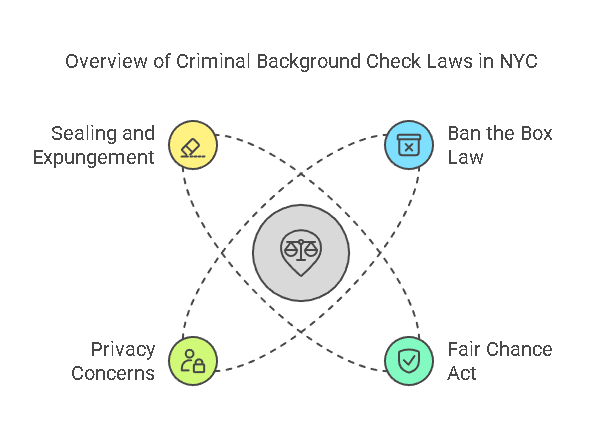
1. Ban the Box Law
One of the most important legal considerations when conducting background checks in NYC is the Ban the Box law, which is part of the Fair Chance Act. The purpose of this law is to prevent discrimination against individuals with criminal records in the hiring process.
- What It Means for Employers: Under the Ban the Box law, employers in NYC are prohibited from asking about an applicant’s criminal history until after a conditional offer of employment has been made. This allows candidates to be evaluated based on their qualifications and not automatically disqualified due to a past conviction.
- Exceptions: There are some exceptions to the Ban the Box rule, such as for jobs that require a criminal background check by law or positions where a criminal history may pose a significant risk to safety or the public.
- What Employers Must Do: If an employer finds a criminal record after extending a job offer, they must conduct an individualized assessment of whether the record is relevant to the job. The employer must also provide the candidate with a copy of the criminal record and allow them the opportunity to dispute any inaccuracies.
2. Fair Chance Act
The Fair Chance Act further protects job seekers with criminal records by requiring employers to consider the nature of the crime, the time passed, and its relevance to the job when making hiring decisions.
- Pre-Employment Process: After a conditional job offer is made, an employer may check criminal records but must follow specific procedures in evaluating the criminal history.
- Disqualification Process: If an employer decides not to hire an individual based on their criminal history, they must provide a notice to the applicant and give them a chance to respond.
3. Privacy Concerns in Criminal Background Checks
One of the key concerns when conducting criminal background checks is the protection of privacy. The use of personal data must comply with several privacy laws, including:
- Fair Credit Reporting Act (FCRA): The FCRA governs how criminal background information is used and disclosed in employment decisions. It requires that employers obtain the applicant’s consent before conducting a background check and ensures that they follow fair practices when evaluating the results.
- New York State Privacy Laws: In addition to federal laws, New York State has specific privacy regulations that govern how criminal background data can be used, including protecting individuals from unfair treatment based on their criminal history.
Employers and organizations must ensure that they follow proper procedures to avoid violating privacy rights and exposing themselves to legal risks.
4. Sealing and Expungement of Criminal Records
In New York, individuals may be able to have certain criminal convictions sealed or expunged, which can help protect their privacy and increase their chances of finding employment or housing.
- Sealing Criminal Records: New York law allows individuals with certain convictions to petition to have their criminal records sealed. Once sealed, the criminal record cannot be accessed by most employers, landlords, or other parties without a court order.
- Expungement: While expungement (the complete removal of a criminal record) is not available for most offenses in New York, sealing provides a similar benefit. Individuals should consult a lawyer to determine if they are eligible to have their criminal records sealed.
FAQs About NYC Criminal Background Checks
Here, we address some frequently asked questions (FAQs) about criminal background checks in NYC, providing clarity on common concerns and helping you navigate the process more effectively.
What is included in a NYC criminal background check?
A typical NYC criminal background check includes information about an individual’s arrests, convictions, and any other criminal history within New York City. It may also include information from the sex offender registry and disposition of cases (e.g., guilty, dismissed, etc.). Some background checks also include records from other states or federal databases if fingerprints are involved.
How do I dispute inaccurate information on my criminal record?
If you find inaccuracies in your criminal record, you can dispute the information with the New York State Division of Criminal Justice Services (DCJS). The DCJS has a process for requesting corrections to criminal records, and you will need to provide documentation to support your claim. If the information is related to a specific arrest or conviction, you may also need to reach out to the court that handled the case.
How long do criminal records stay on file in NYC?
In NYC, criminal records are generally kept indefinitely, unless they are sealed or expunged. Certain offenses, like drug convictions, may have different retention periods. However, if you have had your record sealed, it will no longer be accessible for most purposes, including employment and housing.
Can I request my own criminal background check in NYC?
Yes, individuals can request their own criminal background check in NYC. This can be done through the NYC Department of Criminal Justice Services or other government agencies. You will need to provide personal identification and pay any applicable fees. You can also use third-party services like Precisehire for a quicker, more comprehensive report.
How often are criminal background checks conducted in NYC?
Criminal background checks are typically conducted when someone is applying for a job, housing, or a professional license. Employers, landlords, and licensing agencies may request these checks as part of their screening processes. Additionally, background checks can be requested periodically for employees in sensitive positions.
Conclusion
Navigating the process of obtaining and understanding a NYC criminal background check can be complex, but it is a necessary step for various personal, professional, and legal purposes. Whether you’re an employer, landlord, or an individual seeking to understand your own criminal history, it’s important to understand both the procedural and legal aspects of criminal background checks.
By following the proper procedures, understanding privacy laws, and utilizing reliable services like Precisehire, you can ensure that the process is handled efficiently and in compliance with all applicable regulations. Make sure to stay informed about your rights and responsibilities, and if needed, consult professionals to help you navigate the complexities of the background check process.
By taking these steps, you can make informed decisions while also protecting your privacy and rights.
